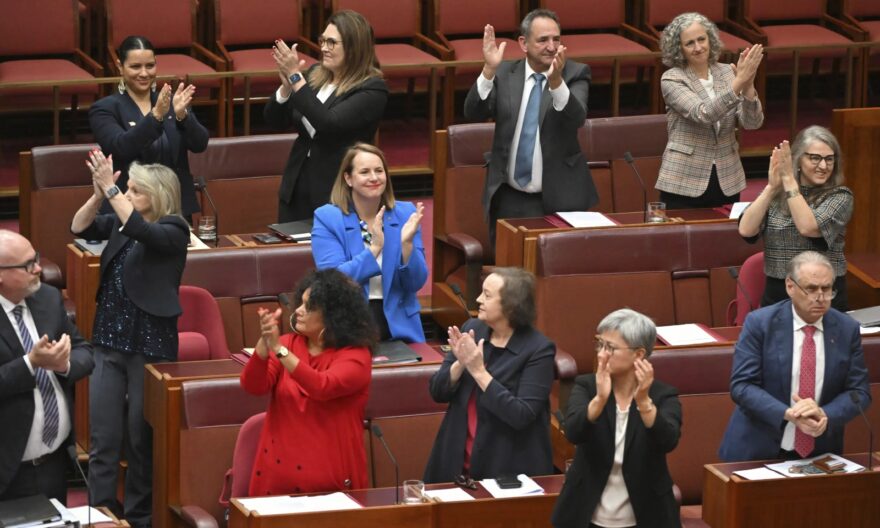
In a significant move, the Australian Senate has approved a referendum to establish an Indigenous Voice to Parliament. The aim of this initiative is to empower the country’s most marginalized ethnic minority by providing them with a greater say in government policies.
The passage of the referendum bill in the Senate was met with applause from predominantly Indigenous individuals in the public galleries. With a vote of 52 in favor and 19 against, the Senate’s decision now requires the referendum to be held on a Saturday within a timeframe of two to six months.
Linda Burney, the Minister for Indigenous Australians and the first Indigenous woman to hold this position, hailed the Senate vote as the “final hurdle” in the journey towards the referendum. She emphasized the importance of initiating a national conversation within communities to discuss the purpose and necessity of an Indigenous Voice and how it can bring about practical change.
The proposed Indigenous Voice to Parliament, while aiming to advocate for Indigenous interests, has sparked intense and divisive debates as it does not grant voting power on laws. This has led to heightened contention among proponents and opponents of the elected body.
Advocates of the Voice hold the belief that it can contribute to improving the living conditions of Indigenous Australians, who make up 3.2% of the country’s population and face significant disadvantages.
The successful passing of the referendum would mark a significant milestone, as it would be Australia’s first successful referendum since 1977 and the first to pass without bipartisan support.
Opposition spokesperson Michaelia Cash acknowledged that most of her colleagues would vote to hold the referendum, not necessarily because they endorse the bill’s ultimate objectives, but rather “because we believe in the people of this nation and their right to have a say.”
Cash expressed concerns about the bill’s potential impact by saying, “This is not because we agree with what this bill ultimately sets out to achieve, which is of course to irrevocably change this nation’s constitution in a way that will destroy one of our most fundamental values: equality of citizenship.”
Senator Jacinta Nampijinpa Price, an Indigenous member of the opposition, expressed her concerns that the Indigenous Voice proposal was causing division in Australia based on racial lines. She believed, “If the ‘yes’ vote is successful, we will be divided forever”. Price emphasized “I want to see Australia move forward as one, not two divided. That’s why I will be voting ‘no,’”.
Independent Senator Lidia Thorpe, also of Indigenous descent, opposed the Voice proposal on the grounds that it lacked power. Thorpe criticized it as “It’s appeasing white guilty in this country by giving the poor little Black fellas a powerless advisory body”.
Prime Minister Anthony Albanese, who had pledged to hold the referendum on the Indigenous Voice, acknowledged the diverse range of opinions on the matter. He stated that the fact that some critics deemed the Voice too weak while others saw it as too powerful indicated that a “we’ve got the balance right.”
Albanese emphasized that, for most individuals, “The truth is that, it will have no direct impact on their lives, but it just might make lives better of the most disadvantaged group in Australia today”. He expressed the view that, “This is an opportunity to do things better. Instead of doing things for Indigenous Australians, make change with Indigenous Australians’”.
The House of Representatives had previously shown overwhelming support for holding the referendum. Albanese mentioned that he would engage in discussions with Indigenous leaders before finalizing the date for the referendum. He is required to provide a minimum notice of 33 days.
The Liberal Party and Nationals party, which formed a conservative coalition government for nine years before the Labor Party’s election last year, both opposed the Indigenous Voice proposal.
Recent surveys indicate a decline in public support for the Indigenous Voice as the “no” campaign gains momentum.
The proposal for the Voice originated in 2017 when a gathering of 250 Indigenous leaders took place at Uluru, a significant sacred site in central Australia. These leaders, delegates of the First Nations National Constitutional Convention, were tasked by the government at the time to provide recommendations on how the Indigenous community could be recognized in the constitution.
However, the conservative government promptly dismissed the notion of the Voice, drawing comparisons to the establishment of a third parliamentary chamber.




